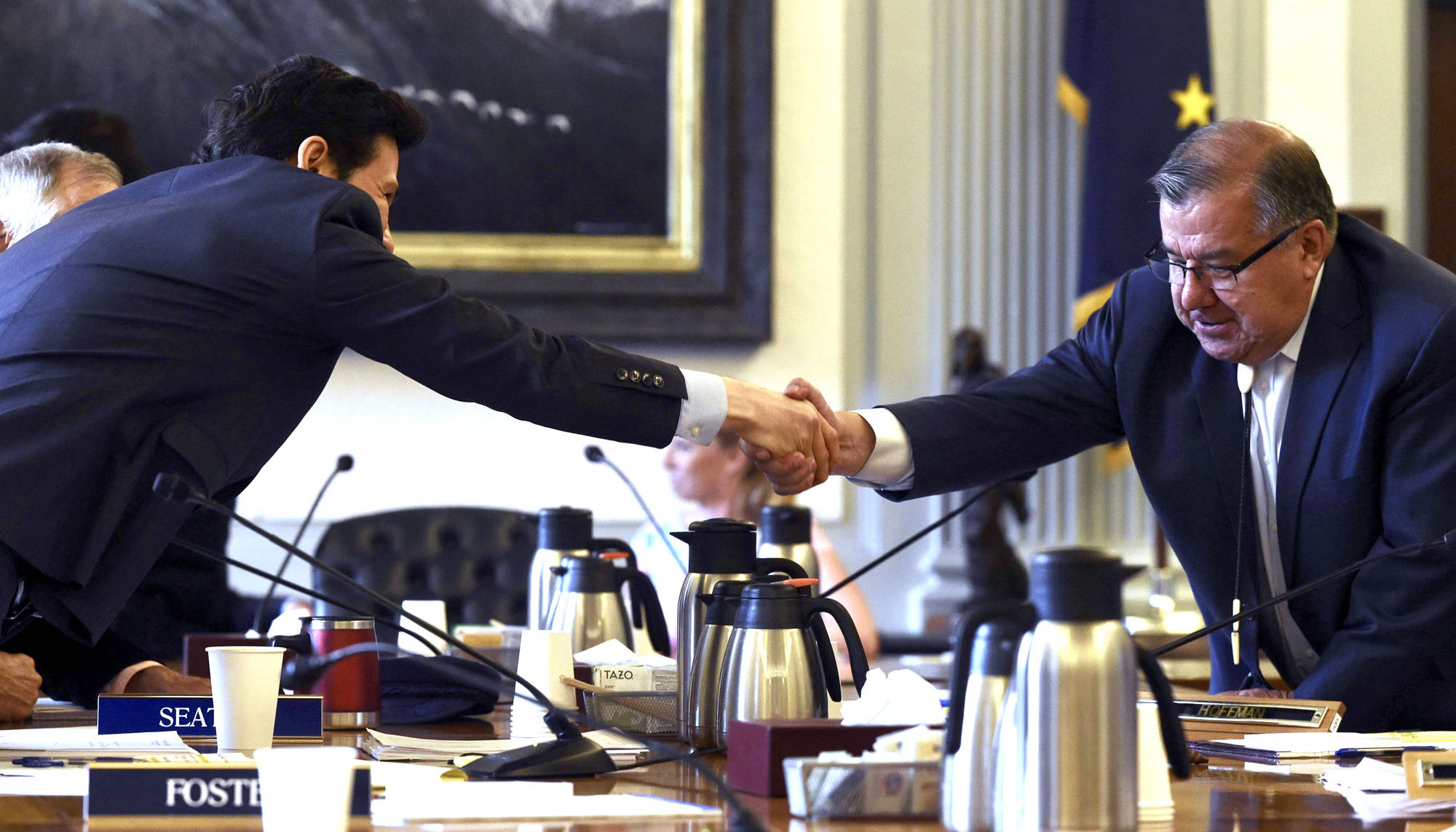In a one-day special session Thursday, the Alaska Legislature passed a $1.4 billion capital construction budget, then adjourned without taking action on Alaska’s larger fiscal problems.
The Senate vote was 15-4, and the House vote was 27-13, with many members crossing caucus and party lines.
“Nobody got everything that they wanted, but overall this is the product of compromise,” said Rep. Neal Foster, D-Nome and the lead House negotiator for the capital budget.
Juneau’s three-person legislative delegation was particularly divided over the issue of Juneau Access, a long-planned $574 million effort to build a road north to quicken the travel time between the capital city and the North American road system.
Previous legislators had allocated tens of millions of dollars for the project, but Gov. Bill Walker in December decided that the road should not be built while Alaska faces a multibillion-dollar budget deficit.
The capital budget passed by the Legislature reallocates about half the $47 million remaining in the Juneau Access fund for transportation projects in Lynn Canal.
Rep. Justin Parish, D-Juneau, voted against the budget. Rep. Sam Kito III, D-Juneau, voted for it, as did Sen. Dennis Egan, D-Juneau.
Parish, who campaigned in 2016 as a Juneau Access opponent, became a proponent once in office.
“Over the past few days, dozens of my constituents have reached out to me,” he said before the House vote. “They have asked me to do everything I can to preserve that funding. … I must be a ‘no’ vote.”
Egan has been a longtime supporter of Juneau Access but voted for the budget. While Parish saw the redistribution of half the road money as a loss, Egan explained that it was a success, because Gov. Bill Walker had originally proposed redistributing all road funding.
“It keeps the road to the capital alive,” Egan said in a floor speech after the Senate vote. “Back in February, it looked like every last nickel would go away, so at least we saved something.”
Rep. Dan Saddler, R-Eagle River, cautioned that the Legislature’s action this year is not a guarantee for future years.
“Once the straw is in the juice box, it’s going to be very easy to draw off the rest of the money in future years,” he said.
Kito did not speak on the House floor but said after the vote that he has not changed his viewpoint and continues to believe that improved ferry service is the best transportation option for Juneau.
Kito said it is possible that some of the redistributed Juneau Access money could pay for a new dock in Skagway that would be used by the Alaska-class ferries under construction in Ketchikan.
Federal funds
While Juneau Access was a paramount concern for capital-city lawmakers, much of the rest of the Legislature had its eyes on a bigger target: $1.2 billion in federal funding. That much money is unlocked with a state match of about $200 million, much of which will come from the state’s statutory budget reserve, which has $288 million remaining.
“Our construction sector is already suffering job losses and uncertainty across Alaska,” said Senate Majority Leader Peter Micciche, R-Soldotna, in a prepared statement. “Providing clarity and certainty in our capital projects spending will allow the Department of Transportation to move forward with confidence in authorizing final work for this summer’s construction season and beginning planning for next year.”
Normally, the Legislature completes the capital budget in April, allowing DOT to send projects to bid before the limited northern construction season.
“It’s all about jobs,” said Rep. Steve Thompson, R-Fairbanks.
Because the Legislature has waited until now to reach agreement on the capital budget ─ which became embroiled in previous debates over the operating budget ─ some of those projects have been delayed.
“Even if we pass this budget today, it’s going to cost a lot of time,” Thompson said.
PFD cuts will stand
House Majority Leader Chris Tuck, D-Anchorage, was among the legislators who took an unusual step Thursday by voting against a budget proposed by his own majority.
Tuck, speaking on the House floor, said he could not vote for a budget process that failed to provide a full Permanent Fund Dividend. He equated the decision to an “unfair” income tax on all Alaskans.
Tuck was among the lawmakers who previously voted for an operating budget that cut the 2017 Dividend to $1,100 per person, but he had pushed for the capital budget to contain additional money for dividends, enough to push an individual Dividend above $2,000.
In the Senate, Sen. Shelley Hughes, R-Wasilla and Sen. Mike Dunleavy, R-Wasilla, took similar stands and joined Sen. Bill Wielechowski, D-Anchorage, and Sen. Berta Gardner, D-Anchorage in voting against the budget because of the dividend issue.
No progress on deficit
In a prepared statement, Gov. Bill Walker said he was “pleased” by the Legislature’s action Thursday and will sign the capital budget before Aug. 1.
Shortly after the House and Senate adjourned, Walker signed House Bill 111 ─ containing cuts to Alaska’s subsidy of oil and gas drilling ─ on the third floor of the capital.
That bill is the first to significantly address Alaska’s multibillion-dollar deficit. The capital budget doesn’t address that deficit, but some lawmakers on Thursday said they expect another special session later this year to address the deficit.
“I hope the administration calls us back to keep pushing for a fiscal solution,” said Rep. Andy Josephson on the House floor before leading into a joke. “I don’t necessarily need that call this month or next month.”
There was only a little laughter.
Contact reporter James Brooks at james.k.brooks@juneauempire.com or call 523-2258.

